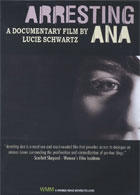
Arresting Ana 2009
Distributed by Women Make Movies, 462 Broadway, New York, NY 10013; 212-925-0606
Produced by Lucie Schwartz
Directed by Lucie Schwartz
DVD, color, 35 min., French with English subtitles
Sr. High - Adult
Eating Disorders, Media Studies, Health Sciences, Political Science, Psychology
Date Entered: 07/08/2010
Reviewed by Wendy Highby, University of Northern ColoradoArresting Ana addresses the uniquely problematic intersection of eating disorders, online behavior, and free speech. “Ana” is a symbolic online guru—essentially a personification of eating disorders—who appears in the “pro-Ana” Web sites and blogs that have proliferated on the Internet. The documentary features 18-year-old Sarah, a French college student who writes a "pro-Ana" blog entitled “In Search of Perfection.” The film includes extensive, candid footage revealing the thoughts and motivation that underlie Sarah’s eating disordered behavior. Rebecka Peebles, a Stanford University pediatrician, provides expert commentary. She is a researcher of pro-eating disorder Web site usage in eating disordered adolescents. Peebles discusses the disturbing and sometimes ethereal imagery on the pro-Ana Web sites and their religiously zealous tone.
The “arrest” in Arresting Ana is the legislative attempt to shut down the sites and stop the self-destructive behavior. The film is set in April 2008 as France becomes the first country in the world to propose legislation banning the pro-Ana sites, claiming they incite anorexia. It tracks Valerie Boyer, a French National Assembly legislator, as she introduces a bill that would punish the Web site authors by imposing fines and prison sentences. The opposing viewpoint, against criminalization, is briefly discussed by legislator Patricia Schillinger.
This well-edited documentary provides singular insight into the nexus of eating disorders, online media, and Internet regulation. The self-revelation of Sarah, the expertise of Dr. Peebles, and the screenshots of the Web sites vividly illuminate the issues. Because of its unique combination of subject matter, the film would be appropriate for instructional purposes in several behavioral and social science areas, including media studies, psychology, sociology, and public policy. It serves as an engaging case study of free speech as it relates to online behavior and the criminalization of disease.
Awards
- Hot Springs Documentary Film Festival, Margaret and Will Hearst Prize for Documentary Excellence